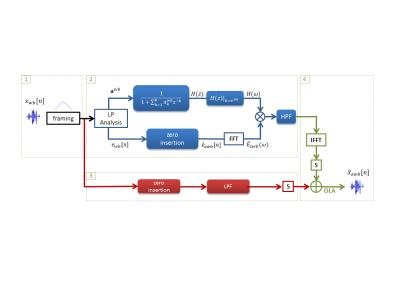Documents
Poster
EFFICIENT SUPER-WIDE BANDWIDTH EXTENSION USING LINEAR PREDICTION BASED ANALYSIS-SYNTHESIS

- Citation Author(s):
- Submitted by:
- Pramod Bachhav
- Last updated:
- 12 April 2018 - 11:37am
- Document Type:
- Poster
- Document Year:
- 2018
- Event:
- Presenters:
- Pramod
- Paper Code:
- 2830
- Categories:
- Keywords:
- Log in to post comments
Many smart devices now support high-quality speech communication services at super-wide bandwidths. Often, however, speech quality is degraded when they are used with networks or devices which lack super-wideband support. Artificial bandwidth extension can then be used to improve speech quality. While approaches to wideband extension have been reported previously, this paper proposes an approach to super-wide bandwidth extension. The algorithm is based upon a classical source filter model in which spectral envelope and residual error information are extracted from a wideband signal using conventional linear prediction analysis. A form of spectral mirroring is then used to extend the residual error component before an extended super-wideband signal is derived from its combination with the original wideband envelope. Improvements to speech quality are confirmed with both objective and subjective assessments. These show that the quality of super-wideband speech, derived from the bandwidth extension of wideband speech, is comparable to that of speech processed with the standard enhanced voice services (EVS) codec with a bitrate of 13.2kbps. Without the need for statistical estimation of missing super-wideband components, the proposed algorithm is highly efficient and introduces only negligible latency.

